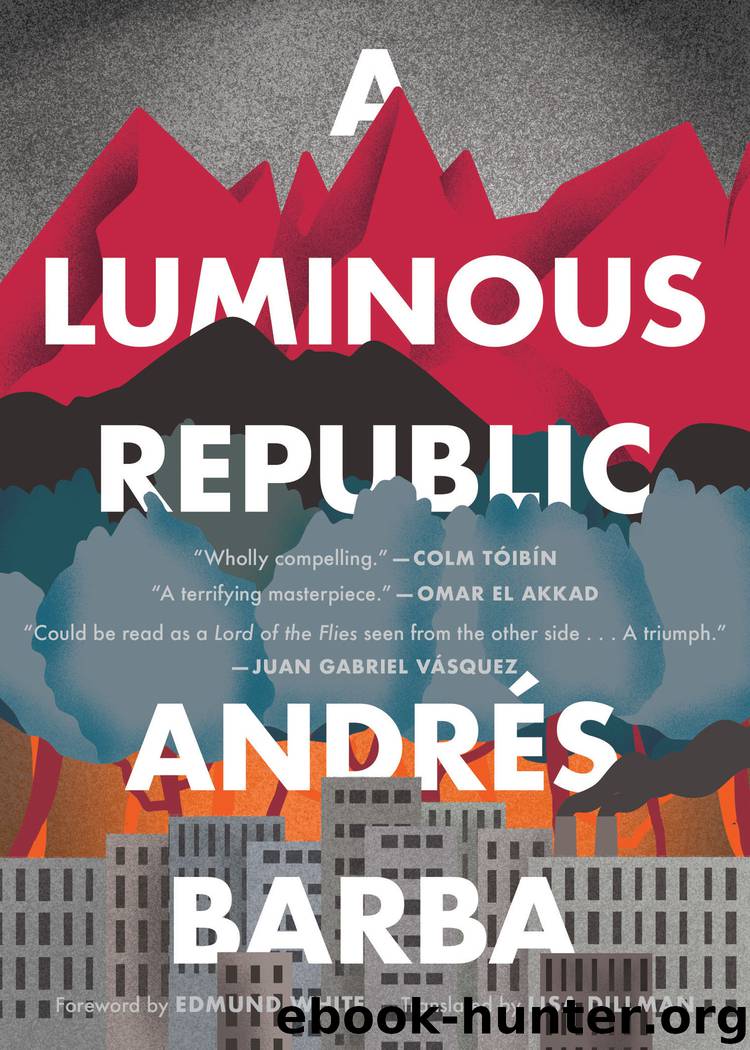A Luminous Republic by Andrés Barba

Author:Andrés Barba
Language: eng
Format: epub, azw3
Publisher: HMH Books
Loss of trust is similar to heartbreak. Both lay bare some internal wound, both make us feel older than we are. After the revelation of the Zapata children’s lie, San Cristóbal became a tense place to live, a place where our children continued putting their ears to the ground, convinced that they would hear messages from the thirty-two, and we had begun to grow suspicious of what was quintessentially undeniable: their innocence. Of course, we’d have been incapable of expressing it in those words. We can only describe with any precision what we no longer feel, what we’ve somehow contained. The struggle to articulate feelings we’re still experiencing is possibly the most touching, and useless, of them all. Perhaps that’s why not even today, twenty years later, is it easy to communicate our loss.
The episodes that transpired over those months may have made us lose faith in the religion of childhood, but the children didn’t have it much easier, and they certainly weren’t waking up to a world any less hostile. For children, the world is a museum in which the adult guardians might be loving most of the time, but that doesn’t stop them from imposing rules: everything there is solid, everything has always already existed, long before them. In exchange for love, the children are required to uphold the myth of their innocence. Not only do they have to be innocent, they have to perform it.
The Zapata case amounted to the expulsion of the children from our official religion. We had to punish someone, and since we couldn’t punish our own kids, we decided to punish the thirty-two. Not only had they refused to act out the myth of Paradise Lost, they had begun to infect our own children. They were the black sheep, the slimy bruise that ends up rotting the fruit. Perhaps many people would find implausible such a blunt change in attitude: I would implore them to spend an afternoon in the archives, to verify the change in tone reflected in the newspapers after the Zapata mother made her declaration.
And not just the newspapers.
According to the San Cristóbal Municipal Plenary Session minutes, item 3, Appeals and Requests, on February 13, 1995, Deputy Isabel Plante proposed for the first time that the district’s age of criminal responsibility be lowered. The preliminary bill—drafted almost explicitly for the thirty-two—attempted to abolish the provision of the Comprehensive Minors Act that stated, in the case of misdemeanor or accessory to felony, any individual under the age of thirteen was exempt from imprisonment and would instead be sentenced to custody overseen by civil commission. According to Madame Plante, the case of the “jungle children,” as they were then being referred to, was so extraordinary as to require its own specific legislation. She proposed special detention centers for any child under thirteen with no known guardian who had taken part in the Dakota Supermarket attack, and conventional prison—the local penitentiary—for those over thirteen. In the event that this was not approved by
Download
This site does not store any files on its server. We only index and link to content provided by other sites. Please contact the content providers to delete copyright contents if any and email us, we'll remove relevant links or contents immediately.
In Control (The City Series) by Crystal Serowka(35411)
The Wolf Sea (The Oathsworn Series, Book 2) by Low Robert(33918)
We Ride Upon Sticks by Quan Barry(33356)
Crowbone (The Oathsworn Series, Book 5) by Low Robert(32387)
The Book of Dreams (Saxon Series) by Severin Tim(32298)
The Daughters of Foxcote Manor by Eve Chase(22356)
Trainspotting by Irvine Welsh(20141)
Call Me by Your Name by André Aciman(19061)
Shot Through The Heart (Supernature Book 1) by Edwin James(17963)
The Secret History by Donna Tartt(16762)
The Girl from the Opera House by Nancy Carson(15020)
Sad Girls by Lang Leav(13395)
American King (New Camelot #3) by Sierra Simone(13068)
Pimp by Iceberg Slim(12999)
All the Missing Girls by Megan Miranda(12835)
The Betrayed by Graham Heather(11751)
The Betrayed by David Hosp(11724)
4 3 2 1: A Novel by Paul Auster(11119)
Still Me by Jojo Moyes(9963)
